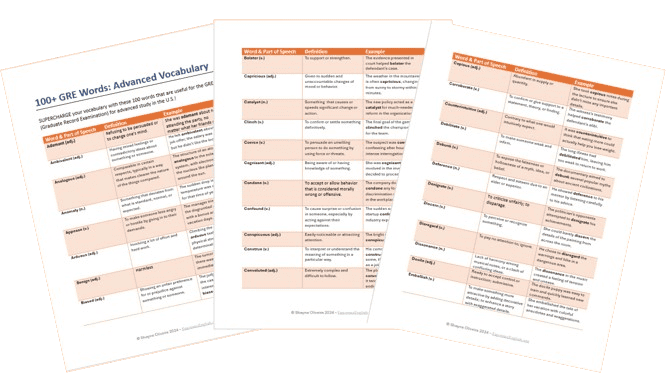Let’s learn 100+ GRE words for more fluent English!
This high-level vocabulary comes from lists that students use when preparing for the GRE – an exam to enter post-college programs for master’s and doctorate degrees.
These advanced words will definitely level up your English fluency!
Adamant (adj.)
Definition: Refusing to be persuaded or to change one’s mind.
Sentence: She was adamant about not attending the party, no matter what her friends said.
Ambivalent (adj.)
Definition: Having mixed feelings or contradictory ideas about something or someone.
Sentence: He felt ambivalent about the job offer; the salary was good, but he didn’t like the location.
Analogous (adj.)
Definition: Comparable in certain respects, typically in a way that makes clearer the nature of the things compared.
Sentence: The structure of an atom is analogous to the solar system, with electrons orbiting the nucleus like planets around the sun.
Anomaly (n.)
Definition: Something that deviates from what is standard, normal, or expected.
Sentence: The sudden drop in temperature was an anomaly for that time of year.
Appease (v.)
Definition: To make someone less angry or hostile by giving in to their demands.
Sentence: The manager tried to appease the disgruntled employees with a bonus and additional vacation days.
Arduous (adj.)
Definition: Involving a lot of effort and hard work.
Sentence: Climbing the mountain was an arduous task, requiring both physical strength and mental determination.
Benign (adj.)
Definition: Harmless.
Sentence: The tumor was benign, so there was no need for immediate surgery.
Biased (adj.)
Definition: Showing an unfair preference for or prejudice against something or someone.
Sentence: The judge was removed from the case due to a conflict of interest and a perceived biased opinion.
Bolster (v.)
Definition: To support or strengthen.
Sentence: The evidence presented in court helped bolster the defendant’s case.
Candid (adj.)
Definition: Truthful and straightforward; frank.
Sentence: Her candid remarks about the project’s flaws were appreciated by the team.
Capricious (adj.)
Definition: Given to sudden and unaccountable changes of mood or behavior.
Sentence: The weather in the mountains is often capricious, changing from sunny to stormy within minutes.
Catalyst (n.)
Definition: An agent that provokes or speeds significant change or action.
Sentence: The new policy acted as a catalyst for much-needed reform in the organization.
Clinch (v.)
Definition: To confirm or settle something definitively.
Sentence: The final goal of the game helped clinch the championship for the team.
Coerce (v.)
Definition: To persuade an unwilling person to do something by using force or threats.
Sentence: The suspect was coerced into confessing after hours of intense interrogation.
Cognizant (adj.)
Definition: Being aware of or having knowledge of something.
Sentence: She was cognizant of the risks involved in the investment but decided to proceed anyway.
Condone (v.)
Definition: To accept or allow behavior that is considered morally wrong or offensive.
Sentence: The company does not condone any form of discrimination or harassment in the workplace.
Confound (v.)
Definition: To cause surprise or confusion in someone, especially by acting against their expectations.
Sentence: The sudden success of the startup confounded many industry experts.
Conspicuous (adj.)
Definition: Easily noticeable or attracting attention.
Sentence: The bright red jacket made her conspicuous in the crowd.
Construe (v.)
Definition: To interpret or understand the meaning of something in a particular way.
Sentence: His comments were construed as an insult by some, though he meant them as a joke.
Convoluted (adj.)
Definition: Extremely complex and difficult to follow.
Sentence: The plot of the novel was so convoluted that I had to read it twice to understand the ending.
Copious (adj.)
Definition: Abundant in supply or quantity.
Sentence: She took copious notes during the lecture to ensure she didn’t miss any important details.
Corroborate (v.)
Definition: To confirm or give support to a statement, theory, or finding.
Sentence: The witness’s testimony helped corroborate the defendant’s alibi.
Counterintuitive (adj.)
Definition: Contrary to what one would intuitively expect.
Sentence: It was counterintuitive to think that eating more could actually help you lose weight.
Debilitate (v.)
Definition: To make someone weak and infirm.
Sentence: The long illness had debilitated him, leaving him too weak to return to work.
Debunk (v.)
Definition: To expose the falseness or hollowness of a myth, idea, or belief.
Sentence: The documentary aimed to debunk several popular myths about ancient civilizations.
Deference (n.)
Definition: Respect and esteem due to an elder or superior.
Sentence: He showed deference to his mentor by listening carefully to his advice.
Denigrate (v.)
Definition: To criticize unfairly; to disparage.
Sentence: The politician’s opponents attempted to denigrate his achievements.
Discern (v.)
Definition: To perceive or recognize something.
Sentence: She could barely discern the details of the painting from across the room.
Disregard (v.)
Definition: To pay no attention to; ignore.
Sentence: He chose to disregard the warnings and ski in the dangerous area.
Dissonance (n.)
Definition: Lack of harmony among musical notes or a clash of conflicting ideas.
Sentence: The dissonance in the music created a feeling of tension and unease.
Docile (adj.)
Definition: Ready to accept control or instruction; submissive.
Sentence: The docile puppy was easy to train and quickly learned new commands.
Embellish (v.)
Definition: To make something more attractive by adding decorative details; to enhance a story with exaggerated details.
Sentence: She embellished the tale of her vacation with colorful anecdotes and exaggerations.
Emulate (v.)
Definition: To match or surpass (a person or achievement) by imitation.
Sentence: He tried to emulate his father’s success in the business world.
Enigma (n.)
Definition: A person or thing that is mysterious or difficult to understand.
Sentence: The disappearance of the ancient civilization remains an enigma to historians.
Esoteric (adj.)
Definition: Intended for or likely to be understood only by a small number of people with specialized knowledge.
Sentence: The professor’s lecture on quantum mechanics was too esoteric for most students.
Eulogy (n.)
Definition: A speech or piece of writing that praises someone highly, typically someone who has just died.
Sentence: The eulogy delivered at the funeral celebrated the remarkable life and contributions of the deceased.
Exacerbate (v.)
Definition: To make a problem or situation worse.
Sentence: His refusal to acknowledge the issue only served to exacerbate the conflict.
Exemplary (adj.)
Definition: Serving as a desirable model; representing the best of its kind.
Sentence: Her exemplary performance at work earned her the Employee of the Month award.
Expedient (adj.)
Definition: Convenient and practical, although possibly improper or immoral.
Sentence: Using a shortcut was expedient, but it violated company policy.
Finesse (n./v.)
Definition: Skillful handling of a situation or delicate task; to handle with subtlety and skill.
Sentence: She handled the negotiation with great finesse, securing a favorable deal for her company.
Fledgling (adj.)
Definition: A young or inexperienced person; just beginning.
Sentence: The fledgling artist struggled to find his unique style in the competitive world of art.
Fluctuate (v.)
Definition: To change continually; to move up and down.
Sentence: Stock prices tend to fluctuate greatly depending on market conditions.
Fluke (n.)
Definition: A surprising chance occurrence, especially a favorable one.
Sentence: Winning the lottery was a fluke; he had never expected such luck.
Frivolous (adj.)
Definition: Not having any serious purpose or value; trivial.
Sentence: The court dismissed the lawsuit, calling it frivolous and without merit.
Garner (v.)
Definition: To gather or collect something, especially information or approval.
Sentence: Her research helped garner widespread support for the new policy.
Idiosyncrasy (n.)
Definition: A distinctive or peculiar feature or characteristic of a place or thing.
Sentence: One of his idiosyncrasies was always tapping his pen when he was thinking.
Immutable (adj.)
Definition: Unchanging over time or unable to be changed.
Sentence: The laws of physics are considered immutable and universal.
Impediment (n.)
Definition: A hindrance or obstruction in doing something.
Sentence: His lack of formal education was seen as an impediment to his career advancement.
Impervious (adj.)
Definition: Not allowing fluid to pass through; unable to be affected by.
Sentence: The new raincoat is made of a material that is impervious to water.
Impetuous (adj.)
Definition: Acting quickly and without thought or care; impulsive.
Sentence: His impetuous decision to quit his job without a backup plan led to many difficulties.
Inadvertent (adj.)
Definition: Not resulting from or achieved through deliberate planning; accidental.
Sentence: The mistake was inadvertent and not intended to cause harm.
Incongruous (adj.)
Definition: Not in harmony or keeping with the surroundings or other aspects.
Sentence: The modern art piece seemed incongruous in the otherwise traditional museum.
Ingenious (adj.)
Definition: Clever, original, and inventive.
Sentence: The ingenious design of the new gadget made it both functional and stylish.
Innocuous (adj.)
Definition: Not harmful or offensive.
Sentence: The remark was intended as a joke and was completely innocuous.
Insidious (adj.)
Definition: Proceeding in a subtle way but with harmful effects.
Sentence: The disease was insidious, showing symptoms only after it had already progressed significantly.
Juncture (n.)
Definition: A particular point in events or time; a critical moment.
Sentence: At this juncture, we need to decide whether to proceed with the project or not.
Juxtapose (v.)
Definition: To place side by side for comparison.
Sentence: The artist’s new exhibit juxtaposes modern art with classical sculptures.
Laudable (adj.)
Definition: Deserving praise and commendation.
Sentence: Her efforts to improve the community were laudable and earned her widespread recognition.
Lethargic (adj.)
Definition: Sluggish and apathetic, low energy.
Sentence: After the long flight, she felt lethargic and struggled to stay awake.
Lull (n.)
Definition: A temporary interval of quiet or lack of activity.
Sentence: There was a lull in the conversation as everyone waited for the results.
Makeshift (adj.)
Definition: Temporary and of low quality, but used because of a sudden need.
Sentence: They built a makeshift shelter using blankets and sticks to protect themselves from the rain.
Mired (past participle of verb)
Definition: Involved in a difficult situation that is hard to escape from.
Sentence: The project was mired in delays and budget overruns.
Mitigate (v.)
Definition: To make something less severe, serious, or painful.
Sentence: Measures were taken to mitigate the effects of the economic downturn.
Myopic (adj.)
Definition: Lacking imagination, foresight, or intellectual insight; short-sighted.
Sentence: His myopic approach to problem-solving prevented him from seeing the bigger picture.
Nascent (adj.)
Definition: Just coming into existence and beginning to display signs of future potential.
Sentence: The nascent tech startup showed great promise in the field of artificial intelligence.
Nuance (n.)
Definition: A subtle difference or variation in meaning, expression, tone, or feeling.
Sentence: The actor’s performance captured the nuances of the character’s complex emotions.
Obfuscate (v.)
Definition: To deliberately make something unclear or difficult to understand.
Sentence: The lawyer’s convoluted explanation seemed designed to obfuscate the truth.
Obstinate (adj.)
Definition: Stubbornly refusing to change one’s opinion or chosen course of action.
Sentence: Despite all the evidence, he remained obstinate in his belief that he was right.
Onerous (adj.)
Definition: Involving a lot of effort and difficulty; burdensome.
Sentence: The new regulations imposed onerous requirements on small businesses.
Overshadow (v.)
Definition: To appear more prominent or important than.
Sentence: The young actor’s talent overshadowed that of his more experienced co-stars.
Placate (v.)
Definition: To make someone less angry or hostile by giving in to their demands.
Sentence: The manager offered a discount to placate the upset customer.
Plausible (adj.)
Definition: Seeming reasonable or probable.
Sentence: The scientist presented a plausible theory that explained the unexpected results.
Polarizing (adj.)
Definition: Causing strong division into opposing groups or opinions.
Sentence: The controversial policy was polarizing and sparked heated debates across the community.
Pragmatic (adj.)
Definition: Dealing with things in a practical and sensible way rather than by theoretical considerations.
Sentence: She took a pragmatic approach to solving the problem, focusing on what would work best in practice.
Precarious (adj.)
Definition: Not securely held or in position; dangerously likely to fall or collapse.
Sentence: The ladder was in a precarious position, making it dangerous to climb.
Precursor (n.)
Definition: A person or thing that comes before another of the same kind; a forerunner.
Sentence: The invention of the telephone was a precursor to many modern communication technologies.
Predisposed (past participle of verb)
Definition: Likely or inclined to be affected by something.
Sentence: He was predisposed to heart disease because of his family history.
Presumptuous (adj.)
Definition: Failing to observe the limits of what is permitted or appropriate; overconfident.
Sentence: It was presumptuous of him to assume that he would be promoted without discussing it first.
Pristine (adj.)
Definition: In its original condition; unspoiled.
Sentence: The beach remained pristine and untouched by human activity.
Prolific (adj.)
Definition: Producing a lot of something; very productive.
Sentence: The prolific writer published several novels each year.
Prudent (adj.)
Definition: Acting with or showing care and thought for the future.
Sentence: It is prudent to save a portion of your salary for unexpected expenses.
Quintessential (adj.)
Definition: Representing the most perfect or typical example of a quality or class.
Sentence: Her performance was the quintessential example of great acting.
Redundant (adj.)
Definition: Not or no longer needed or useful; superfluous.
Sentence: The use of redundant phrases made the report unnecessarily lengthy.
Respectively (adv.)
Definition: Separately or individually and in the order already mentioned.
Sentence: Bob and Jane will take their tests at 10 a.m. and 11 a.m., respectively.
Reticent (adj.)
Definition: Not revealing one’s thoughts or feelings readily; reserved.
Sentence: She was reticent about discussing her personal life with colleagues.
Revamp (v.)
Definition: To change or improve something.
Sentence: The company decided to revamp its marketing strategy to attract more customers.
Rife (adj.)
Definition: Abundant or widespread (especially something undesirable).
Sentence: The neighborhood was rife with noise and pollution due to the construction work.
Rudimentary (adj.)
Definition: Basic or elementary; not advanced.
Sentence: The rudimentary skills taught in the first year of training laid the foundation for more complex techniques.
Savor (v.)
Definition: To enjoy or appreciate something completely.
Sentence: She took a moment to savor the beautiful sunset before heading home.
Scrupulous (adj.)
Definition: Very concerned to avoid doing wrong; diligent and attentive to details.
Sentence: The accountant was scrupulous in checking every entry to ensure accuracy.
Sparse (adj.)
Definition: Thinly dispersed or scattered; not dense.
Sentence: The vegetation in the desert is sparse, with only a few hardy plants surviving.
Sporadic (adj.)
Definition: Occurring at irregular intervals or only in a few places; scattered.
Sentence: The sporadic rainfall made it difficult to plan outdoor events.
Subside (v.)
Definition: To become less intense, violent, or severe.
Sentence: After the storm, the winds began to subside, and the rain eased.
Succinct (adj.)
Definition: Briefly and clearly expressed.
Sentence: The summary was succinct, capturing all the key points in just a few paragraphs.
Surmise (v.)
Definition: To suppose that something is true without having evidence to confirm it.
Sentence: I can only surmise that he was late due to traffic, based on his previous messages.
Tangential (adj.)
Definition: Diverging from the main point; not directly related.
Sentence: The discussion became tangential, veering away from the main topic.
Tantamount (adj.)
Definition: Equivalent in seriousness to; virtually the same as.
Sentence: His refusal to cooperate was tantamount to admitting guilt.
Timely (adj.)
Definition: Happening at the right time; opportune.
Sentence: The paramedics’ timely intervention saved the woman’s life.
Transient (adj.)
Definition: Lasting only for a short time; temporary.
Sentence: The city’s transient population meant that neighborhoods were constantly changing.
Travesty (n.)
Definition: A false, absurd, or distorted representation of something.
Sentence: The trial was a travesty of justice, failing to properly address the evidence.
Trivial (adj.)
Definition: Of little value or importance.
Sentence: The argument over who should wash the dishes seemed trivial compared to the bigger issues they were facing.
Ubiquitous (adj.)
Definition: Present, appearing, or found everywhere.
Sentence: Smartphones have become ubiquitous in modern society, with nearly everyone owning one.
Unconscionable (adj.)
Definition: Not guided by conscience; shockingly unfair or unjust.
Sentence: The conditions in the factory were unconscionable, with workers enduring unsafe and inhumane practices.
Undermine (v.)
Definition: To weaken or damage something gradually or covertly.
Sentence: The constant criticism was meant to undermine her confidence and authority.
Underscore (v.)
Definition: To emphasize or highlight something.
Sentence: The teacher used several examples to underscore the importance of following instructions.
Unearth (v.)
Definition: To dig up or discover something hidden.
Sentence: Archaeologists unearthed ancient artifacts that provided new insights into the civilization.
Unorthodox (adj.)
Definition: Contrary to what is traditional or expected.
Sentence: His unorthodox teaching methods were initially met with skepticism but eventually proved effective.
Vestige (n.)
Definition: A trace or remnant of something that is disappearing or no longer exists.
Sentence: The ruins of the old castle were a vestige of a bygone era.
Volatile (adj.)
Definition: Subject to rapid or unpredictable change; easily evaporated.
Sentence: The stock market can be volatile, with prices fluctuating wildly in short periods.
Warranted (past participle of verb)
Definition: Justified or required by the circumstances.
Sentence: The use of extra security was warranted due to the high-profile nature of the event.
Winsome (adj.)
Definition: Attractive or charming in a sweet or innocent way.
Sentence: Her winsome smile and friendly demeanor made her very popular at the party.
Hope you enjoyed learning these GRE words! Join my Advanced Vocabulary and Collocations Course to learn 1,000+ advanced English words fast.
Learn more:











